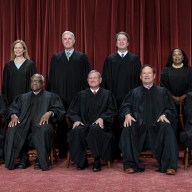WASHINGTON – It was big news in Canada: Najibullah Zazi, the man accused of plotting what might have been the biggest U.S. terrorist attack since 9-11, travelled twice to Canada in the months prior to his arrest.
And yet as Americans pore over every detail of his high-profile arrest, the Canadian connection has barely registered, despite assertions by prosecutors that Zazi’s visits north of the border – and trips to Pakistan, allegedly for terrorism training – were reasons he should be considered a flight risk.
There’s been little sign of the “blame Canada” rhetoric so prevalent in the U.S. in the weeks and months following the Sept. 11 attacks.
Some suggest that’s because Canada might not have done anything wrong if American authorities failed to alert their Canadian colleagues that Zazi was a threat.
It’s also unclear when Zazi travelled to Canada. A relative in Mississauga, Ont., has been vague, saying it was some time in the past year or two. U.S. authorities have had Zazi under surveillance since August 2008.
Chris Sands, a border expert at the Washington-based Hudson Institute, said if there was a falldown at the Canada-U.S. boundary, it could have been an American rather than Canadian mistake.
“Since we had admitted him in the U.S. and there was no flag on him, it makes sense that Canadian officials wouldn’t have been worried about him either,” he said of Zazi, an Afghan national who was a teenager living in New York during the 9-11 attacks.
“And if we had reason to suspect and we weren’t warning Canadians, it was derelict on our part since this is someone who could have posed a threat to the safety of Canadians. But I suspect we will find out there has been co-operation between the U.S. and Canada on Zazi, and that Canadian officials were watching him closely.”
Canadian officials have not commented on the Zazi arrest, and U.S. authorities have yet to provide any further information about precisely when the 24-year-old Denver airport employee travelled to Canada.
Zazi will be arraigned in a New York courthouse on Tuesday, accused of conspiring to use weapons of mass destruction aimed at Manhattan subway trains on the eighth anniversary of 9-11.
During a Denver hearing on Friday, Zazi’s lawyer pointed to the Canadian connection as reason his client should not, in fact, be considered a flight risk. Arthur Folsom pointed out that he flew back to Denver on Sept. 12 when a Queens imam warned him that U.S. federal agents were looking for him.
“He had the option of getting on a plane and flying to Canada or Pakistan or flying to virtually anywhere else on the planet, but he got back on a plane and flew back to Colorado,” Folsom said.
Beyond that, there have been little, if any, public concerns raised in the U.S. about the security of the Canada-U.S. boundary in the aftermath of Zazi’s arrest despite months of tensions between the two countries about border security.
“The reason it’s barely getting mentioned down here is because it pretty much much confirms what Americans have already long suspected: that although the border is a little bit better policed, it is a pretty easy one for bad guys to cross,” Sands said.
“We have already taken on the assumption in the U.S. that homegrown cells have relatively free run in North America.”
That’s despite months of efforts at the highest levels of government to convince the Obama administration that Canada treats border security as a top priority after years of tight, post 9-11 security under George W. Bush. Those tight security measures have long prompted exporters to complain that trade has been hindered.
Janet Napolitano, homeland security secretary, ruffled feathers earlier this year when she suggested the 9-11 terrorists came to the U.S. from Canada, and for suggesting the Canadian border should be treated no differently than the U.S.-Mexico boundary, where a 1,000-kilometre fence is currently under construction to keep out illegal immigrants.
Upon word of Zazi’s arrest, Prime Minister Stephen Harper said: “I’ll say it before, I’ll say it again: National security threats against the United States are almost invariably national security threats in Canada.”
American authorities have been watching Zazi for more than a year, when wiretaps reportedly captured him communicating with Osama bin Laden followers. Zazi first attracted their attention on Aug. 28, 2008, when he flew from the Newark, N.J. airport to Peshawar, Pakistan – a hive of terrorist activity on the Afghan border.
Prosecutors allege Zazi received explosives training from al-Qaida in Pakistan and returned to the United States bent on building a bomb.
















